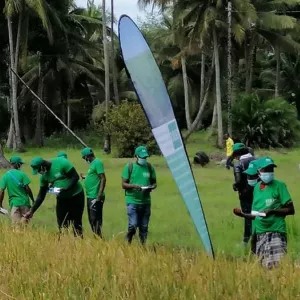Farmers, seed producers, crop breeders validate and identify suitable rice seed varieties for their farms in Mozambique
Stakeholders of the all-rice value chain gathered together to raise awareness on the newly-released improved rice varieties in Mozambique on 12 July 2022. Participants including farmers from four districts in Zambezia province, officials of the International Rice Research Institute Mozambique office and its partners worked together and discussed the different improved rice varieties and identify which are suitable for

Farmers, seed producers, crop breeders validate and identify suitable rice seed varieties for their farms in Mozambique
Stakeholders of the all-rice value chain gathered together to raise awareness on the newly-released improved rice varieties in Mozambique on 12 July 2022.
Participants including farmers from four districts in Zambezia province, officials of the International Rice Research Institute Mozambique office and its partners worked together and discussed the different improved rice varieties and identify which are suitable for cultivation in their respective farms.
The activity was conducted through a Tricot Trial methodology (triadic comparison of technologies) where farmers are empowered to identify or validate the most suitable technology or crop varieties for the local conditions of their own farm in realistic conditions, and taking into account variable contexts.
Participants of the field day selected the rice varieties in the field and assessed the grain quality (paddy and milled grain). After that, they discussed their preferences.
In the selection of the varieties in the exhibition/fair, the “Chupa” variety was voted as the top preferred rice variety, with the same number of votes as the “Tumbeta” variety. The participants observed that these rice varieties have good grain quality, do not split after processing, and have a good aroma.
As part of the program, the stakeholders also talked about the effects of climate change in their crops. Rice farmers mentioned that they experience extreme weather conditions and suffer from the impacts of floods and droughts at different parts of the year. They also raised their concern about the lack of infrastructure for irrigation which affects their productivity.
Researchers encouraged the participants to try the improved varieties resistant to drought, tolerant of floods, and with better yields. They also stressed that producers should be informed of the weather forecasts to be able to anticipate and address rainfall-related challenges, and eventually increase the quality and quantity…

